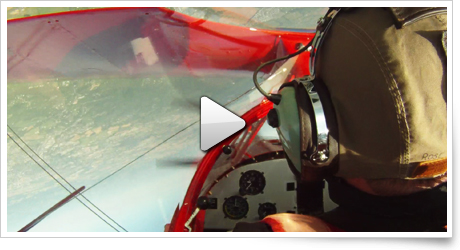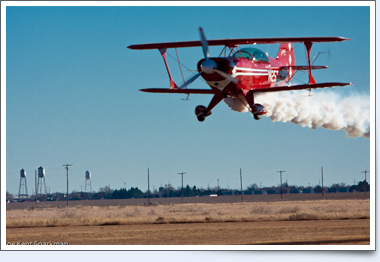| ||||||
| Cirrus raising funds for Vision Jet |
| |||||
| Sponsored by: | ||||||
| Click here to view this week's custom content online.
| |||||||||||||||||||||||||||||||||||||||||||||||||||||||||||||||||||||||||
featuredSpin myths | |||||||||||||||||||||||||||||||||||||||||||||||||||||||||||||||||||||||||
GA NewsCirrus raising funds for Vision JetDevelopment of the Vision SF50 personal single-engine jet by Cirrus Design continues on a daily basis, but it will take an additional $64 million to bring it to market. That’s why Cirrus officials see 2010 as the year for fundraising. If funding is found this year, next year will be devoted to the construction of a conforming prototype known as C0 (conforming zero). Once that aircraft is flying, it will be 18 months before deliveries could begin. Read more >> Lycoming to produce own pistonsMost manufacturers farm out work to subcontractors to save money, but Lycoming is returning the production of pistons to its factory. The company has not made pistons in nearly 50 years. Pistons are built in a multimillion-dollar mini-factory that begins with cylindrical aluminum forgings and ends with a completed piston. The process relieves Lycoming of dependency on subcontractors. Lycoming officials said they believe the new technology makes them more competitive. Read more >>
Light sport measured volcano ashGerman university scientists used a Flight Design CT Supralite in mid-May to measure ash from an erupting volcano in Iceland. The Supralite is a model similar to the CTLS sold in the United States but weighs 260 pounds less. The aircraft’s climb capability was used to take measurements from 1,000 feet to 14,000 feet. Modifications to the Supralite were unnecessary, since the probe could be mounted through the copilot air vent, the same one seen on the door of the CTLS. Read more >> | |||||||||||||||||||||||||||||||||||||||||||||||||||||||||||||||||||||||||
| | Flying the same airplane without incident for 12+ months? You’re entitled to 10% claims free credits your first year with Avemco®—15% your second! Also receive up to 10% off your annual premium with Avemco’s Safety Rewards. Learn more. |
AD to require inspection of oxygen cylinders
The FAA is adopting a new airworthiness directive for certain AVOX Systems and B/E Aerospace oxygen cylinders, as installed on various airplanes. The AD, which takes effect July 6, requires operators to inspect for and remove substandard oxygen cylinders from the airplane. The FAA is issuing the AD to “prevent an oxygen cylinder from rupturing, which, depending on the location, could result in structural damage and rapid decompression of the airplane, damage to adjacent essential flight equipment, deprivation of the necessary oxygen supply for the flightcrew, and injury to cabin occupants or other support personnel.” It was prompted by the reported rupture of a high-pressure gaseous oxygen cylinder. The FAA estimates the AD will affect 10,000 airplanes in the United States.
Original Lake amphib prototype flies again
The original Colonial C-1 Skimmer prototype flew for the first time in 1948 and set the stage for a long line of Lake amphibians. On May 29 of this year, that same airplane—serial No. 1—flew demonstration flights for local media at Walter J. Koladza Airport in Great Barrington, Mass. John Staber, flight instructor and longtime pilot of Lake amphibian aircraft, said he found the airplane in pieces in a warehouse outside of Cleveland, Ohio, in 1999, and spent 11 years restoring it before taking it out for a test flight May 22. Read more >>
| | Life Insurance for Pilots - Rates have changed! Significantly better coverage options are available from A+ rated life insurance companies. Get complete coverage with no aviation exclusions. Don’t overpay for life insurance because you fly. Pilot Insurance Center - the experts at getting pilots the right life insurance coverage. Call (800) 380-8376 or www.piclife.com. |
![]()
 Don’t miss this year’s AOPA Aviation Summit
Don’t miss this year’s AOPA Aviation Summit
Each year AOPA strives to make its annual convention, AOPA Aviation Summit, the must-attend event of the year for pilots and aviation enthusiasts. This year is no different. The association has reached out to some of the biggest names in aviation: Patty Wagstaff, Sean Tucker, Dale Snodgrass, Mike Melvill, Dick Rutan, Corky Fornoff, Rod Machado, and Skip Holm will all be on hand to host dinners, speak at forums, and much more. Watch AOPA Live >>
Can high blood pressure threaten your medical?
What condition is most likely to cause you problems when you go to see the aviation medical examiner (AME) for your next medical certificate? Untreated high blood pressure. But hypertension is easily treatable, and most medications are accepted by the FAA. AOPA's Medical Certification Director Gary Crump tells you what you need to know before you schedule your next visit with an AME. Watch AOPA Live >>
Big plans at Eclipse
Eclipse Aerospace, the new owner of the much-touted Eclipse 500 product line, has big plans for the little jet. In AOPA’s exclusive interview, co-founder Mike Press reports on future production plans and upgrading the current fleet. Watch AOPA Live >>
For daily news updates, see AOPA Online.
| | HAVE YOU SEEN THE FUTURE OF AVIATION? REMOS Aircraft has reinvented personal aviation, by combining the best features of the LSA class with real-world utility and adventure. Featuring the best of German precision engineering and modern manufacturing in an economical, safe and fun-to-fly aircraft, the REMOS GX is changing what General Aviation means. Come and see the future of aviation at www.REMOS.com. |
Safety & Proficiency
 FAA reminds pilots to be cautious flying at night
FAA reminds pilots to be cautious flying at night
The FAA said last week in a Safety Alert for Operators (SAFO) that pilots should be vigilant about operating at nontowered airports at night. According to the SAFO, there have been a number of incidents recently where the pilot hasn’t activated the pilot-controlled lighting, prompting the agency to remind instructors to teach students about such operations. Additionally, the SAFO said, no ground operations should be conducted without the pilot-controlled lighting being illuminated.
Dangerous shortcuts
Sometimes, people will do anything to get ahead, including falsifying information and taking shortcuts. In aviation, those actions can be deadly. Just after 11 p.m. on Nov. 22, 2008, a Malibu Meridian appeared to be making a normal approach to Runway 16 at Marshfield, Wis., when it rolled hard to the left and crashed about half a mile from the threshold. The pilot and both passengers were killed. The sudden loss of control—in light winds within sight of the runway—wasn’t the only thing that was odd about the flight. Read more in this special report from the AOPA Air Safety Foundation.
Safety Pilot: A personal and systemic failure
For the general aviation pilot who might be contemplating an airline career, the Colgan Air Q400 accident in Buffalo in February 2009 may have some far-reaching consequences. The FAA recently closed a public comment period on the need for additional certification for new air carrier pilots. Perhaps we really don’t need more rules, just better application of the existing ones. The failures at Buffalo were both individual and systemic. Read more >>
| | Airlines resume hiring! Will you be ready? ATP’s Airline Career Pilot Program takes you from Private to Commercial Multi and CFI in 90 Days. Learn why American Eagle recruits ATP graduates and why ATP CFIs get hired! ATPFlightSchool.com/eagle |
Getting there safely … most of the time
If your idea of fuel management is getting close enough to glide the rest of the way to the runway threshold, consider what it would be like if the airline captain for your next commercial flight took the same approach. “ Would you fly this airline?” The AOPA Air Safety Foundation poses the question in a Pilot Safety Announcement designed to address an issue that causes some of the most preventable accidents in general aviation. Find more fuel management resources in the foundation’s safety spotlight.
Pilots share experiences, lessons learned on Facebook
Whether they encountered skies as smooth as glass or stopped short of their destination because of thunderstorms, pilots traded stories about holiday-weekend flying this week on the AOPA Air Safety Foundation Facebook page. The foundation now has more than 2,600 Facebook fans; join them and stay informed about the latest safety quizzes, online courses, and other valuable safety products—plus share stories of first solos, exciting trips, close calls, lessons learned, and more.
| | Your IFR rating in 10 days at your location, IFR finish-up in as little as 3 days! Professional teachers and our own curriculum. 30 years experience. G1000 and Avidyne Entegra IFR specialists. Put it on your calendar NOW. 800-435-9437, www.iflyifr.com |
Flight Instructor Refresher Clinics | AOPA Air Safety Foundation Safety Seminars | |||||||||
For a complete schedule, see AOPA Online. Can’t make it in person? Sign up for the CFI Refresher Online. |
Topics vary—for details and a complete schedule, see AOPA Online. | |||||||||
| | Sectional charts are sometimes unwieldy in the cockpit. EZFlightChart.com has come up with a solution—a spiral-bound version of a chart. The books are the same sectional the FAA prints, but copied into the new format. Prices start at just $12.99. Use coupon code “AOPA13” for a 20% discount on your order. Click Here to learn more. |
ADVOCACY
ADS-B: The next 10 years
It costs thousands of dollars and provides little to no safety benefit, and you couldn't buy one today if you wanted to. But you'll need an Automatic Dependent Surveillance-Broadcast Out (ADS-B Out) unit in your aircraft by 2020 to continue to operate in airspace that currently requires a transponder. The FAA’s final rule setting a deadline for equipage estimates the cost for general aviation to be anywhere from six to 22 times the benefits GA will reap. AOPA is pressing the FAA to close that gap by increasing the benefits and lowering the cost. Read more >>
Will you reap the benefits?
The FAA says in the ADS-B Out rule that it will consider expanding the services for ADS-B beyond what it currently has planned, and AOPA continues to maintain that a successful transition will be based on tangible benefits such as expanded ATC coverage and low-cost traffic and weather services. Read more >>
Equipping 190,000 aircraft
The most immediate barrier to GA equipage is the fact that no ADS-B unit currently exists that meets the criteria set forth by the FAA. Over the next 10 years, manufacturers must develop a unit that meets FAA specifications and produce enough to equip an expected 87 percent of the GA fleet—185,000 to 190,000 aircraft. Read more >>
| | Touch 'n go with Garmin's aero™ GPS portables Transition seamlessly from roadway to runway with the intuitive touchscreen control of Garmin's aero series. Each model comes preloaded with automotive maps, built-in terrain/obstacles database, high and low Airways and more. Find out which is right for you at garmin.com/aviation |
Statue of Liberty overflight ends with police escort
An ultralight pilot received a police helicopter escort May 31 after he flew too close to the Statue of Liberty. According to press reports, the pilot came within 150 feet of the Statue of Liberty before being escorted to nearby Westchester County Airport in White Plains, N.Y. The pilot told reporters that he didn’t realize security was so tight in the New York City area. “Pilots can’t afford to make these kinds of mistakes,” said Brittney Miculka, AOPA manager of security and borders. Read more >>
Complex presidential TFRs warrant careful planning
When the president traveled in the years immediately following 9/11, large sections of airspace could shut out general aviation for days on end. Now, a system of security screenings, gateway airports, and restrictions grants GA pilots increased access to an area during the president’s extended stay. But, as many pilots experienced last weekend in Chicago, the procedures for traveling within a TFR may be complex, and notams may change with little advance warning—and recent violations of the presidential TFR over Chicago underscore the importance of careful preflight planning. Read more >>
| | Share your thoughts on Aviation Headsets What’s important to you when choosing an aviation headset? Please take a few moments to complete an online survey. Help influence the headset industry. Go to survey >> |
GA pilots seek access to San Jose airport
An airport master plan update at Norman Y. Mineta International Airport in San Jose, Calif., could be the opening general aviation pilots have been waiting for to gain access to the facility. GA has slowly been squeezed out of the airport over the past couple of decades. The airport stopped accepting new tenants for city-owned hangars in 1995. Airport officials also switched their focus to high-end corporate aircraft, to the exclusion of lighter GA aircraft. Read more >>
Tall structures, airports don’t mix
Tall obstacles—cell phone towers, wind turbines, or other structures—built too close to airports create a hazard for pilots and those on the ground. Compatible land-use regulations for airports can help minimize the likelihood of a too-tall structure being built near your airport. AOPA members in Oklahoma recently banded together to protect their airports from obstructions by contacting their state legislators and urging them to pass “The Aircraft Pilot and Passenger Protection Act.” It worked. Read more >>
GA leaders discuss threats to aviation at aerospace summit
AOPA President Craig Fuller joined aviation leaders for a panel discussion, “Threats to General and Business Aviation,” June 3 at the Oklahoma Aerospace Summit and Expo, where about 500 representatives from aerospace companies large and small gathered. Fuller, along with other GA leaders, discussed FAA reauthorization, protecting community airports, and the negative perception of GA in the media and public, among other topics. Read more >>
Florida gov. signs long awaited use-tax exemption into law
Florida is once again officially open for business for the many out-of-state aircraft owners seeking to visit the state for fly-ins like Sun ’n Fun, aircraft repairs, flight training, or just for pleasure. Gov. Charlie Crist signed House Bill 173 into law May 27, creating a permanent exemption for visiting out-of-state aircraft from Florida’s 6-percent use tax on the total value of aircraft. “I am confident this legislation maintains Florida’s stellar reputation as a business- and tourist-friendly state,” Crist said. Read more >>
Take pride in your airport, get involved
General aviation airports are an endangered species, so to speak. With limited land to build new airports and pressure from developers to take over the green space that airports create, pilots must become actively involved in protecting these facilities. AOPA Vice President of Airport Advocacy Bill Dunn spoke to pilots, airport managers, and aviation consultants at the fourth annual Delaware Aviation Summit last week, giving them examples of how to protect their local airports. Read more >>
| | AOPA member, Adam Epstein, experienced firsthand how the AOPA Aircraft Financing Program makes aircraft financing easy and aircraft ownership affordable through Bank of America, N.A.For more information or to have a representative call you to discuss financing, go to www.aopa.org/loans. |
Compatible land-use measure could save headaches
A little planning can save a lot of headaches and lost funds when it comes to developing the land around airports. That’s why the California Senate passed a bill June 2 that would require airport land-use commissions in each county that has a public-use general aviation airport. A law was enacted in the 1960s that did just that, but over the decades, changes and exemptions had been made to the law allowing some counties to operate airports without having an airport land-use commission. Read more >>
Get tools to protect your airport in free Webinar
You can be your airport’s first line of defense against encroachment, conflict with neighbors, and closure. Join AOPA’s airports team on Thursday, June 10, for a Webinar at 3 or 9 p.m. Eastern time to find out about common threats to airports and how you can protect and promote the importance of your airport. Register online.
| | The AOPA Legal Services Plan is just like having life, car, or homeowners insurance - wise protection in case of an unforeseen emergency. And it's useful even if you aren't in a jam. Protect yourself with the AOPA Legal Services Plan. |
Member Benefits
Register for medical expiration reminder
For those who haven’t seen the big 40 yet and who maintain only a third class medical, five years between visits to the aviation medical examiner is a long stretch. And for those on the other side of 40, our memories of what we had for breakfast may be a little unreliable. That’s why AOPA has developed a new tool to help all of us remember one of those important dates in our lives, the expiration date of our airman medical certificates. Read more >>
AOPA Leatherman perfect for home, office, or hangar
The AOPA Leatherman is as rugged as its name implies. This marvelous implement packs 12 separate tools into its compact size—measuring less than 5 inches when folded and weighing just 5 ounces. There’s no reason to keep a toolbox in your airplane or hangar when so many of the everyday fixes you need can be accomplished with the AOPA Leatherman. Read more >>
| | FREE Video Tip! — Courses for Beginner to Pro! Click for a Free Video Training Tip and find a course to achieve your next goal, or to make your flying safer and more rewarding. Not sure? Call us at 800-854-1001 and talk to one of our pilot training advisors. |
Community
Picture PerfectAOPA’s online photo gallery allows you to upload your own aviation photography as well as view, rate, and comment on others’ photos. Your favorite aviation images from AOPA Pilot are still available online through this new gallery. Take a look, and submit your own photos! |
AOPA PiReps: A dreamA pilot’s wife looks at her husband’s passion for flight, his family, his community, and keeping all three safe. Read more >>
| ||||||||
Engage in Aviation Check out user-submitted events from your region. To include an event or to search all events in the calendar, visit AOPA Online. AOPA does not endorse the events listed below, nor have ePilot editors edited the submissions. AOPA assumes no responsibility for events listed. | |||||||||
| |
QUIZ ME!Here’s a question asked by an AOPA member who contacted our aviation services staff through the AOPA Pilot Information Center. Test your knowledge.
Question: I received a Triennial Aircraft Registration form 8050-73 from the FAA. It says on the form that if my information has not changed that I do not need to send it back. Is this true?
Answer: No. Even though the form’s directions state that you do not need to return it if the information is correct, 14 CFR 47.51 requires you to return the form within 60 days of its issuance regardless of changes. Read more >>
|
| | ||||
| ePilot Editor: Sarah Brown | Contributors: Alyssa Miller Jill Tallman Warren Morningstar Alton Marsh | Dave Hirschman Tom Horne Ian Twombly | Production Team: Daniel Pixton Lezlie Ramsey William Rockenbaugh Mitch Mitchell | Advertise in ePilot: |
| Member Tools: Send feedback | Update member profile/e-mail | Unsubscribe | ePilot Archive © Aircraft Owners and Pilots Association | 421 Aviation Way Frederick, MD 21701 | Phone 800/USA-AOPA | Fax 301/695-2375 | ||||







 Blogs
Blogs

